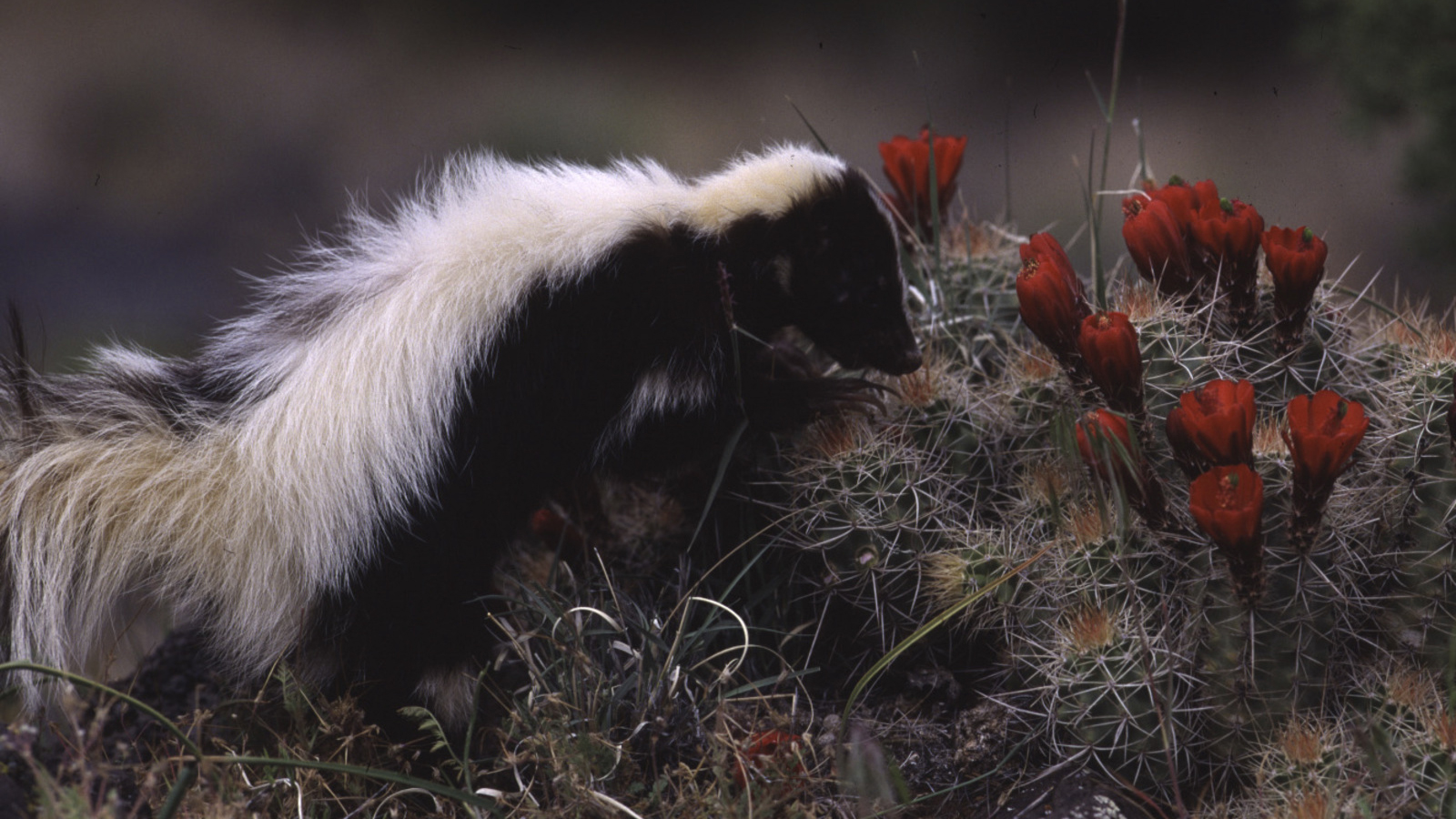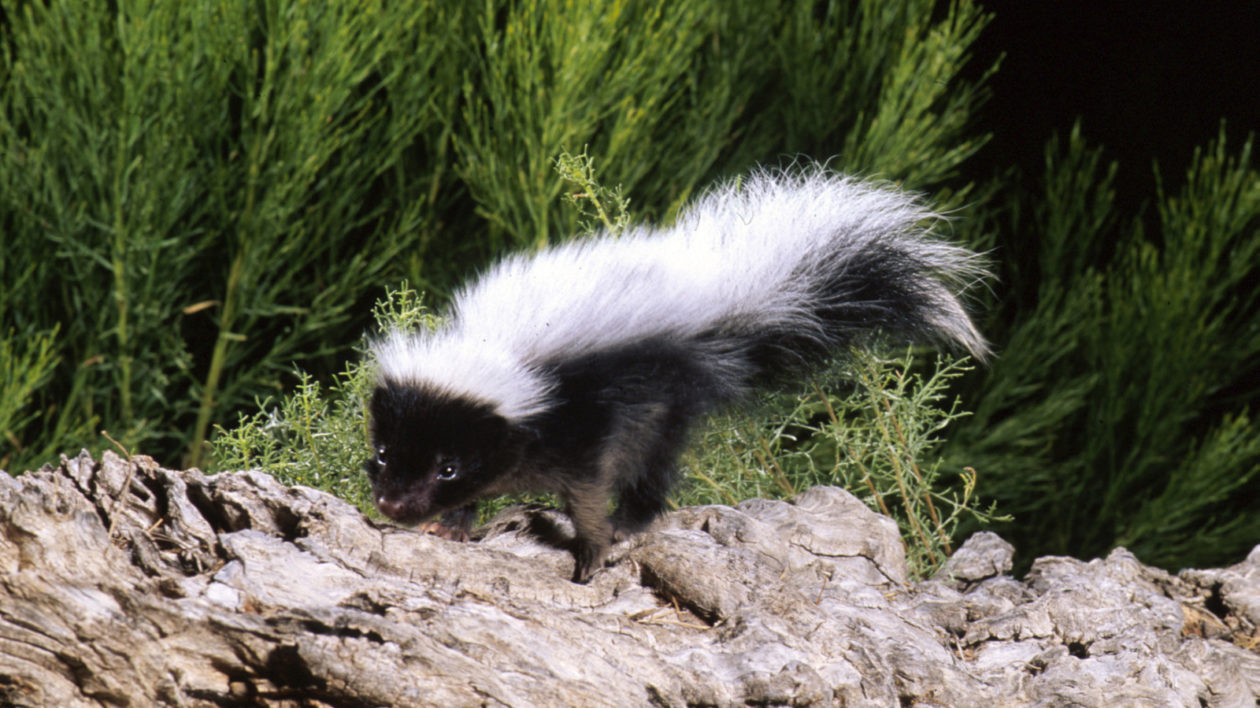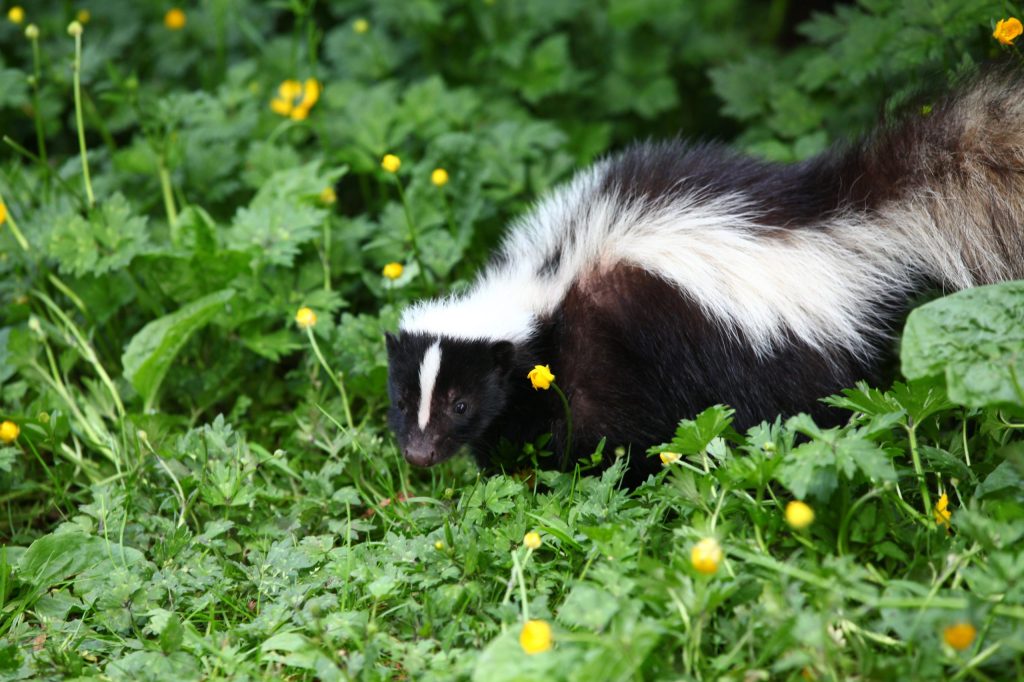On my drive to work this morning, I caught an unpleasant whiff of striped skunk several times. For the past week, skunk musk has assaulted my nostrils with increasing regularity. Perhaps you’ve noticed the same thing.
No, there isn’t a sudden population explosion of skunks. It’s all tied to their behavior. There are indeed times of the year when you’re more likely to smell a skunk. Here’s why.
Striped skunks are solitary, nocturnal critters. Despite thriving alongside humanity, they generally stay out of sight and out of mind. Given their propensity for spraying musk when threatened, you might think – given the high population likely living near you – you’d smell them all the time. Skunks spray as a last resort, and their survival depends on them being somewhat secretive.
But at times, they become very noticeable – sometimes due to their behavior and sometimes due to ours.
Striped skunks give birth to a litter of young, called kits, in the early spring. The kits are born naked, blind and helpless. The mother skunk goes out hunting and foraging and brings food back to the den until the skunks are two months old. Then they start joining her on forays, learning to dig insects and perhaps locate your garbage.
Being solitary, it is soon time for the young skunks to disperse. Depending on where you live, that’s right about now. So there are lots of young, relatively inexperienced skunks roaming around.

As I think back on skunk encounters, I’m struck by how often I have encountered them in August and September. I recall the night as a youngster I heard some rustling in our backyard. I led my mom and brother on my first of many night safaris. Suddenly a rather perturbed skunk appeared in my flashlight beam. I turned and ran, nearly knocking my mom over — and leaving my light-free family members to face the skunk in the dark. I still hear about my cowardice to this day.
Still, young skunks find themselves in much bigger trouble. The human environment offers no shortage of food: unattended pet food, garbage and litter, grubs and other insects, house mice, backyard poultry and their eggs, and other delicacies. Some skunks even specialize in bee hives, with mothers teaching young techniques for effectively extracting honey.
Suburbia is filled with potential den sites, with spaces under sheds, decks and homes providing ideal skunk condos.
This seeming skunk utopia comes with risks. The first is dogs. While coyotes, badgers and other predators avoid skunks, dogs have not gotten the memo. They attack skunks with abandon, leaving you to douse them with tomato juice or other concoctions that won’t work. (Interestingly, one suburban predator that successfully targets skunks is the great-horned owl. One notable owl nest contained nearly 60 skunks!).
An even bigger problem for skunks is roads. Skunks possess excellent senses of smell and hearing, but have poor eyesight. They are poorly equipped to deal with a car going 35 miles per hour.
Right now, a lot of young skunks are dealing with dogs and cars for the first time. You will smell the results.

There’s one other time of year when you’re more apt to smell these animals. That’s February, the mating season. Male skunks are fighting. Female skunks may be shooing away males they don’t want to mate with. All this stressful activity causes some musk to be deposited. It’s not as strong as you will find along the road: you might detect a slight skunky aroma emitting from under your shed in February. That’s from skunk activity.
You may not have even realized a skunk was living under your shed until this point.
The rest of the year, the most noticeable sign is when they dig in your yard. They leave small, circular holes around the yard. But they’re ridding your lawn of grubs.
Despite their bad reputation, striped skunks are actually low-key, low-maintenance neighbors.
Just keep an eye out for skunks on the road the next few weeks (actually, it’s a good idea to drive with wildlife in mind at any time of year). Tend your dog, your garbage and your chickens (also a good idea). And if you go out on a night safari in your neighborhood, make sure the whole family has flashlights.




Please mention that outdoor cats also play a role in this. Sometimes more so than dogs.
What is the best way to rid a dog of skunk oder?
Hi Mary, Thank you for the question! MythBusters tried a variety of things and decided that a mix of hydrogen peroxide, baking soda and dish soap worked best. That’s the closest to evidence for what works best that I know of: http://www.discovery.com/tv-shows/mythbusters/mythbusters-database/skunk-smell/
Thanks for the skunk info. We have lots of skunks here in North Texas.
Matt,
I’ve been keeping a few hives in my backyard for almost twenty years. Skunks do occasionally bother the hives, but only by standing by the entrance at night and eating bees as they come out to investigate or defend. I have never heard of skunks eating honey. How would they get into the hive to get at the honey? Are you sure about that? Nothing in any beekeeping books that I’ve read about them eating honey, just bees.
Geoff
Hi!
I have a 8 month old male skunk…
It’s mom got hit by a car and I saved him!
He is an angel but needs more; he wants to explore and he has been in my kitchen living amongst myself two children two dogs and a cat!
He wants to go…… but he has never fed himself or he is not afraid of dogs and people etc!
I feel bad for him; does anyone have any suggestions on where I could possibly take him to live out his life?
(his name is Romeo)
Hi Deanne, I suggest looking for a wildlife rehabilitation center near you and calling them for advice. Thank you!
I live where skunks are very common. In fact, I sometimes see a mother and her kittens walking single file just across the creek from my house. However, just as all that glitters is not gold, all that smells like that is not necessarily a skunk. When you “smell a skunk” in August or September, it is often not an animal, but a plant: cannabis. It is at its most fragrant at the same time that young, inexperienced skunks are encountering dogs and cars, and the average person cannot tell the difference between the two scents.
One of the favorite foods of skunks is yellow jackets. These stinging terrors nest in the ground and are sometimes called ground bees. Skunks love to dig into their nests and eat the larva. During a building boom in the ’50s in Yorktown NY, the skunks had been chased away by the noise and activity and yellow jackets took over. It was scary just going outside. The town actually imported skunks to provide relief.
Good article answering a question I always asked before now.
We were setting up a garage sale one evening when our dog started playing with 2 baby skunks nearby. We were horrified, no spray was emitted from his new friends (too young, we figured with relief ) . After we put the dog in the house, all seemed safe. A few weeks later, Jazzy encountered his “friends” and.started to play, only getting totally sprayed. The tomato juice didn’t work, but the pet store had a “stunk spray wash”. Jazzy and cute skunks lost their friendship!
Many years ago when we lived in Maine, I noticed that one of our young cats smelled slightly of skunk.
As we returned from an evening trip to town we saw the reason for Freddy’s slight aroma. There was a family of skunks playing in our front pasture and Freddy was playing right there with them. What a sight!
We have one that comes into my yard that is almost white, It’s about 3 or 4 years now that we see her. It eats the bird seed that falls from the feeder, I also let some of the corn out that we put out for the squirrels and deer.
Here in Colorado, when I would stop at a red light, I used to be sure when I smelled a skunk, now I’m not so sure.
A great article; thanks, Matt!
I on the outskirts of the city limits here in Baton Rouge. My 3-street subdivision has large (1+ acres) lots. Behind my property are a few acres of servitude bordered by a large creek. Lots of tall grass, large trees – just where you would think skunks would make home. And they have. At night when I walk my dog I have to keep him on a leash. It is not unusual that I see (and smell) skunks crossing the street, digging in my and other yards. They are so cute to look at, but that is where cute stops. My Dachshund has slipped his leash and tangled with them a few times. He still hasn’t learned!!
Because their natural habitat surrounding our city is being taken from them for development, they are being pushed into residential areas in greater numbers. I guess we are going to have to live with them.
Same with coyotes; they too have been pushed into our residential areas. I hear them most nights “laughing” and howling. They have become somewhat used to humans so I frequently see them crossing the back of my property during the day. Sure wish they had a taste for skunk!
Thanks for your informative article.
Warmest regards.
This is good to know. Enjoyable reading!
I remember when I was around 3 yrs. or 4 yrs. old riding over a Mt. in Tennessee with my parents on a cool enough night for the heater in the car to be on. My dad yelled!!!! Then screamed “Pole CAT”. I had visions of a cat on a pole my father had hit. But momma explained as the smell quickly engulfed the inside of the car and we had to ride with windows down the whole way home.
I love skunks no matter that they smell.